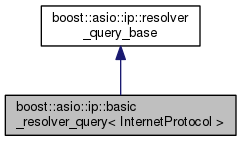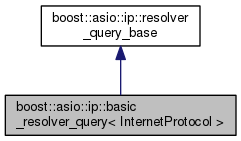An query to be passed to a resolver. More...
#include <basic_resolver_query.hpp>


Public Types | |
| typedef InternetProtocol | protocol_type |
| The protocol type associated with the endpoint query. More... | |
| enum | flags { canonical_name = BOOST_ASIO_OS_DEF(AI_CANONNAME), passive = BOOST_ASIO_OS_DEF(AI_PASSIVE), numeric_host = BOOST_ASIO_OS_DEF(AI_NUMERICHOST), numeric_service = BOOST_ASIO_OS_DEF(AI_NUMERICSERV), v4_mapped = BOOST_ASIO_OS_DEF(AI_V4MAPPED), all_matching = BOOST_ASIO_OS_DEF(AI_ALL), address_configured = BOOST_ASIO_OS_DEF(AI_ADDRCONFIG) } |
Public Member Functions | |
| basic_resolver_query (const std::string &service, resolver_query_base::flags resolve_flags=passive|address_configured) | |
| Construct with specified service name for any protocol. More... | |
| basic_resolver_query (const protocol_type &protocol, const std::string &service, resolver_query_base::flags resolve_flags=passive|address_configured) | |
| Construct with specified service name for a given protocol. More... | |
| basic_resolver_query (const std::string &host, const std::string &service, resolver_query_base::flags resolve_flags=address_configured) | |
| Construct with specified host name and service name for any protocol. More... | |
| basic_resolver_query (const protocol_type &protocol, const std::string &host, const std::string &service, resolver_query_base::flags resolve_flags=address_configured) | |
| Construct with specified host name and service name for a given protocol. More... | |
| const boost::asio::detail::addrinfo_type & | hints () const |
| Get the hints associated with the query. More... | |
| std::string | host_name () const |
| Get the host name associated with the query. More... | |
| std::string | service_name () const |
| Get the service name associated with the query. More... | |
An query to be passed to a resolver.
The boost::asio::ip::basic_resolver_query class template describes a query that can be passed to a resolver.
| typedef InternetProtocol boost::asio::ip::basic_resolver_query< InternetProtocol >::protocol_type |
The protocol type associated with the endpoint query.
|
inherited |
|
inline |
Construct with specified service name for any protocol.
This constructor is typically used to perform name resolution for local service binding.
| service | A string identifying the requested service. This may be a descriptive name or a numeric string corresponding to a port number. |
| resolve_flags | A set of flags that determine how name resolution should be performed. The default flags are suitable for local service binding. |
/etc/services. On Windows, service names may be found in the file c:\windows\system32\drivers\etc\services. Operating systems may use additional locations when resolving service names.
|
inline |
Construct with specified service name for a given protocol.
This constructor is typically used to perform name resolution for local service binding with a specific protocol version.
| protocol | A protocol object, normally representing either the IPv4 or IPv6 version of an internet protocol. |
| service | A string identifying the requested service. This may be a descriptive name or a numeric string corresponding to a port number. |
| resolve_flags | A set of flags that determine how name resolution should be performed. The default flags are suitable for local service binding. |
/etc/services. On Windows, service names may be found in the file c:\windows\system32\drivers\etc\services. Operating systems may use additional locations when resolving service names.
|
inline |
Construct with specified host name and service name for any protocol.
This constructor is typically used to perform name resolution for communication with remote hosts.
| host | A string identifying a location. May be a descriptive name or a numeric address string. If an empty string and the passive flag has been specified, the resolved endpoints are suitable for local service binding. If an empty string and passive is not specified, the resolved endpoints will use the loopback address. |
| service | A string identifying the requested service. This may be a descriptive name or a numeric string corresponding to a port number. May be an empty string, in which case all resolved endpoints will have a port number of 0. |
| resolve_flags | A set of flags that determine how name resolution should be performed. The default flags are suitable for communication with remote hosts. |
/etc/hosts. On Windows, host names may be defined in the file c:\windows\system32\drivers\etc\hosts. Remote host name resolution is performed using DNS. Operating systems may use additional locations when resolving host names (such as NETBIOS names on Windows).On POSIX systems, service names are typically defined in the file /etc/services. On Windows, service names may be found in the file c:\windows\system32\drivers\etc\services. Operating systems may use additional locations when resolving service names.
|
inline |
Construct with specified host name and service name for a given protocol.
This constructor is typically used to perform name resolution for communication with remote hosts.
| protocol | A protocol object, normally representing either the IPv4 or IPv6 version of an internet protocol. |
| host | A string identifying a location. May be a descriptive name or a numeric address string. If an empty string and the passive flag has been specified, the resolved endpoints are suitable for local service binding. If an empty string and passive is not specified, the resolved endpoints will use the loopback address. |
| service | A string identifying the requested service. This may be a descriptive name or a numeric string corresponding to a port number. May be an empty string, in which case all resolved endpoints will have a port number of 0. |
| resolve_flags | A set of flags that determine how name resolution should be performed. The default flags are suitable for communication with remote hosts. |
/etc/hosts. On Windows, host names may be defined in the file c:\windows\system32\drivers\etc\hosts. Remote host name resolution is performed using DNS. Operating systems may use additional locations when resolving host names (such as NETBIOS names on Windows).On POSIX systems, service names are typically defined in the file /etc/services. On Windows, service names may be found in the file c:\windows\system32\drivers\etc\services. Operating systems may use additional locations when resolving service names.
|
inline |
Get the hints associated with the query.
|
inline |
Get the host name associated with the query.
|
inline |
Get the service name associated with the query.